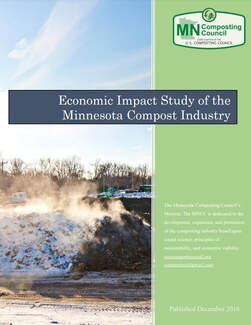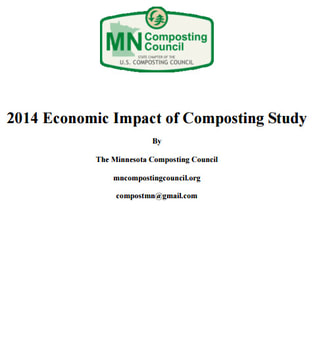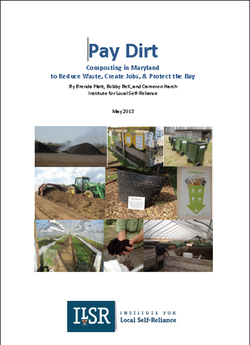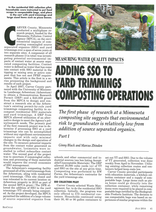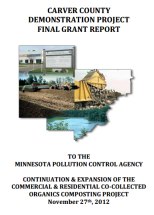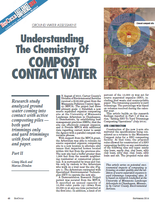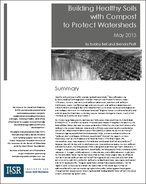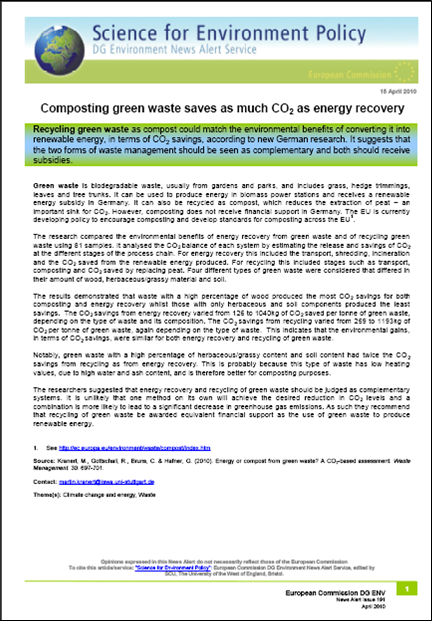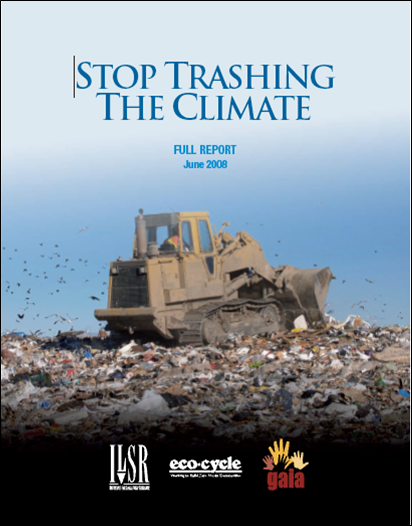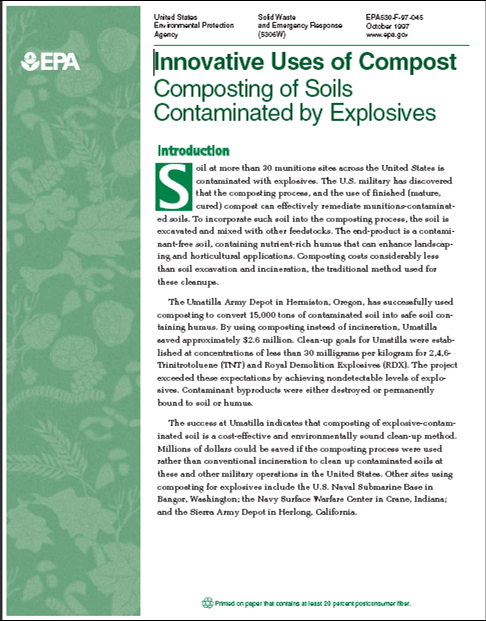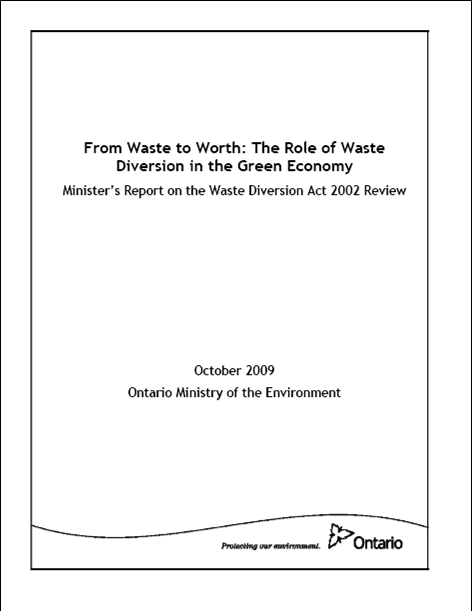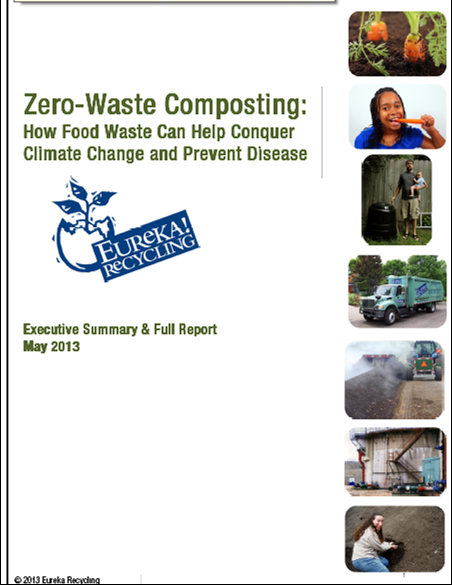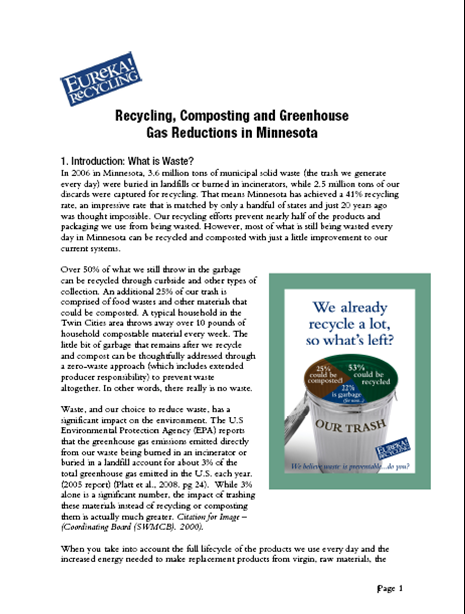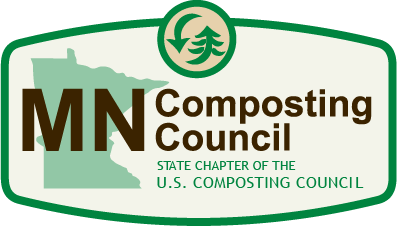Research Studies And Reports
Disclaimer: Periodically reports not written by the MNCC are published on this web page. They are reports of general interest to our membership and broader community. They do not necessarily reflect the positions of the MNCC or the views of its board of directors. For that please see our Policy position paper.
|
The MNCC has released several Composting Industry Economic Impact studies. The most recent is 2018, but we are working to update this as we speak!
The study dives into the composting world and takes a comprehensive look at the economic impact and economic growth potential of Minnesota's composting industry. With direct comparisons drawn between recent data and data gathered in the MNCC's 2014 Economic Impact Survey, these results showcase the vibrant, growing compost industry in Minnesota. |
Research
Phosphorus and Compost White Paper: What We Know and What We Don't Know.
Compost is a product made from natural occurring materials (leaves, food waste, manures....). Because of this it contains Phosphorus (P). Minnesota is well know for its lakes and P, when leached into water bodies, can cause algae growth resulting in poor water quality. As a result, a number of questions surround the fate of P in compost: Does it leach? If it does what chemical types of P leach (some are more reactive then others in water), How much leaches? and many more questions. The MNCC undertook this paper to provide answers what answers we could find. Like any good research, it raised as many questions as it answered. We invite you to read about what we learned.
Composting Redes Seed Viability of Garlic Mustard (Alliaria petiolata) and Common Buckthorn (Rhamnus cathartica)
Joseph Van Rossum and Mark J. Renz (2015) Composting Reduces Seed Viability of Garlic Mustard (Alliaria petiolata) and Common Buckthorn (Rhamnus cathartica). Invasive Plant Science and Management: July-September 2015, Vol. 8, No. 3, pp. 284-291.
Soil Test Interpretations and Fertilizer Management for Lawns, Turf, Gardens and Landscape Plants
Carl J. Rosen, Peter M. Bierman and Roger D. Eliason, Department of Soil, Water, and Climate, University of MN Extension
Minnesota Landscape Arboretum 2009 Fungal Study Report
Neil Carlson, Industrial Hygienist and Tran Huynh, Industrial Hygiene intern
Compost is a product made from natural occurring materials (leaves, food waste, manures....). Because of this it contains Phosphorus (P). Minnesota is well know for its lakes and P, when leached into water bodies, can cause algae growth resulting in poor water quality. As a result, a number of questions surround the fate of P in compost: Does it leach? If it does what chemical types of P leach (some are more reactive then others in water), How much leaches? and many more questions. The MNCC undertook this paper to provide answers what answers we could find. Like any good research, it raised as many questions as it answered. We invite you to read about what we learned.
Composting Redes Seed Viability of Garlic Mustard (Alliaria petiolata) and Common Buckthorn (Rhamnus cathartica)
Joseph Van Rossum and Mark J. Renz (2015) Composting Reduces Seed Viability of Garlic Mustard (Alliaria petiolata) and Common Buckthorn (Rhamnus cathartica). Invasive Plant Science and Management: July-September 2015, Vol. 8, No. 3, pp. 284-291.
Soil Test Interpretations and Fertilizer Management for Lawns, Turf, Gardens and Landscape Plants
Carl J. Rosen, Peter M. Bierman and Roger D. Eliason, Department of Soil, Water, and Climate, University of MN Extension
Minnesota Landscape Arboretum 2009 Fungal Study Report
Neil Carlson, Industrial Hygienist and Tran Huynh, Industrial Hygiene intern
Grant Projects
Carver County Environmental Services
Carver County Environmental Services received three separate grants from the Minnesota Pollution Control Agency in 2006, 2008, and 2012 to conduct research at two different Demonstration Compost Sites at the University of Minnesota Landscape Arboretum in Chanhassen, Minnesota. The research goal was to begin characterization of potential environmental impacts of contact water and storm water generated from compost facilities accepting yard waste, food scraps, and non-recyclable paper. Below are the final reports for those research projects. For more information on these projects, contact Marcus Zbinden, Senior Environmental Specialist with Carver County Environmental Services.
Email: [email protected] Phone: 1-952-361-1806.
Carver County Environmental Services
Carver County Environmental Services received three separate grants from the Minnesota Pollution Control Agency in 2006, 2008, and 2012 to conduct research at two different Demonstration Compost Sites at the University of Minnesota Landscape Arboretum in Chanhassen, Minnesota. The research goal was to begin characterization of potential environmental impacts of contact water and storm water generated from compost facilities accepting yard waste, food scraps, and non-recyclable paper. Below are the final reports for those research projects. For more information on these projects, contact Marcus Zbinden, Senior Environmental Specialist with Carver County Environmental Services.
Email: [email protected] Phone: 1-952-361-1806.
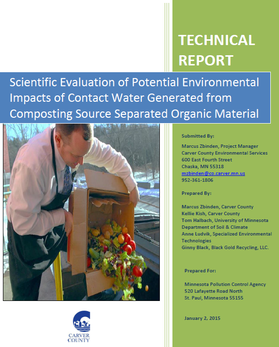
2012-2014 Carver County Research Project: Scientific Evaluation of Potential Environmental Impact of Contact Water Generated from Composting Source Separated Organic Materials (Final Report published in 2015.)
Final Report: Click image to the left
Appendix A: MPCA Grant Agreement & RFP
Appendix B: Arboretum Demonstration Compost Facility Site Operation Plan
Appendix C: Braun Intertec - Compost Pad Permeability Report (Dec. 2013)
Appendix D: Grant Sampling Analysis Plan
Appendx E: C.B. Wilson. EOR, Inc. Pad and Infiltration Characteristics (April 2014)
Appendix F: MPCA Review of Technical Report & Project Teams Response
Appendix G: R. Kaiser, American Engineering Testing - Comments to MPCA Rules for Compost Facilities (April 2014)
Lab Reports: Phase I (2012) - part 1; Phase I (2012) - part 2; Phase II (2013)
Note: The report and several attachments are 80+ pages and may take some time to download.
Final Report: Click image to the left
Appendix A: MPCA Grant Agreement & RFP
Appendix B: Arboretum Demonstration Compost Facility Site Operation Plan
Appendix C: Braun Intertec - Compost Pad Permeability Report (Dec. 2013)
Appendix D: Grant Sampling Analysis Plan
Appendx E: C.B. Wilson. EOR, Inc. Pad and Infiltration Characteristics (April 2014)
Appendix F: MPCA Review of Technical Report & Project Teams Response
Appendix G: R. Kaiser, American Engineering Testing - Comments to MPCA Rules for Compost Facilities (April 2014)
Lab Reports: Phase I (2012) - part 1; Phase I (2012) - part 2; Phase II (2013)
Note: The report and several attachments are 80+ pages and may take some time to download.
Additional Carver County Research
Other Research
The Use of A Special Event (PGA Championship) to Educate the Attendees to Separate Compostables from MSW (December 2002). Funded by the Solid Waste Management Coordinating Board and Carver County.
M. Zbinden, Pollution Abatement Increased Beneficial Insects Associated with Sustainable Landscapes, University of Minnesota Graduate Research Project. March 1999.
The Use of A Special Event (PGA Championship) to Educate the Attendees to Separate Compostables from MSW (December 2002). Funded by the Solid Waste Management Coordinating Board and Carver County.
M. Zbinden, Pollution Abatement Increased Beneficial Insects Associated with Sustainable Landscapes, University of Minnesota Graduate Research Project. March 1999.
Reports
MPCA Solid Waste Policy Report
The MPCA complete its 2019 Solid Waste Policy Report. It lays out strategies for managing solid waste until 2022. Information regarding management of organics is on pages 14-15, 24, and Recommendations are given on pages 36-37. Click here for the Report.
The MPCA complete its 2019 Solid Waste Policy Report. It lays out strategies for managing solid waste until 2022. Information regarding management of organics is on pages 14-15, 24, and Recommendations are given on pages 36-37. Click here for the Report.

